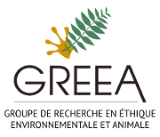About the GRÉEA
The GRÉEA is an interuniversity and interdisciplinary research group in environmental and animal ethics, associated with the Centre de recherche en éthique (CRÉ). Created at the initiative of Ely Mermans and their colleagues in 2016, the GRÉEA is funded as a research team funded by the FRQ-SC since 2019. GRÉEA’s members include researchers (professors/teachers in university/CEGEP, post-doc students, etc.) and graduate students (Master’s or PhD level) whose work concerns environmental and/or animal ethics.
The GRÉEA acknowledges that its activities take part primarily on the territory of what is now Montreal. This territory has long served as a meeting place and exchange between Aboriginal peoples, including the Haudenosaunee and Anishinaabeg nations.
The main aim of the GRÉEA is to support and structure research in environmental and animal ethics, particularly from a non-anthropocentric perspective, as well as to encourage collaboration between researchers in these fields. The GRÉEA pursues this objective through the organization of various research activities (e.g. conferences, workshops, training activities), the promotion of its members’ work, and by offering logistical and financial support to research done in these fields (e.g. graduate scholarships, postdoctoral fellowships, publication and dissemination support).
GRÉEA also aims to make research in environmental and animal ethics, in both French and English, more visible and more accessible to non-academic audiences. Members of the GRÉEA are committed to ensuring that their research has a tangible impact on society. They share the conviction that we must question anthropocentric approaches in order to better protect non-human animals and the environment.
Putting theory into practice
We are committed to reducing the negative impact of our activities on non-human animals and ecosystems. We serve only plant-based food and beverages, as local and organic as possible, in non-disposable tableware, at GRÉEA events. We only fund travel by train, bus, boat, or even less environmentally damaging modes. We favour electronic and digital over printed materials whenever possible.
